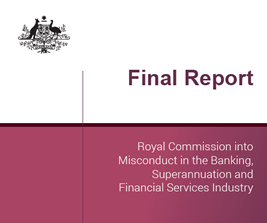February 20, 2019

Recommendations
Kenneth Hayne from the Royal Commission into Misconduct in the Banking, Superannuation and Financial Services Industry, has handed down a staggering 76 recommendations. With the release of the final report, it raises the question as to whether the industry is fully aware of the storm it is facing.
Most of the key players acknowledge that what was discovered during the Royal Commission has led to a decline in trust. But are they fully aware of how these outcomes will combine with growing levels of consumer scepticism?
Levels of Trust
Edelman, a communications marketing firm, conducts an annual global study to determine levels of trust. Their 2018 research showed an overall decline in trust across four institutions: media, government, business and non-government organisations. The results indicate that we are in a battle for the truth, and knowing who we can trust to provide it.
In July 2018, Deloitte released research into the Australian Financial Services Industry, where they’d surveyed over 1,000 Australian consumers.
The insights in this report established that trust in the Australian Financial Services Industry had ‘taken a dive’. The report stated that:
- 32 per cent of customers said their trust in the finance industry had deteriorated in the previous 12 months
- 25 per cent of customers did not trust the financial services industry, with banking and insurance the least trusted
- 47 per cent (that’s almost half) of customers did not trust their own financial services provider.
The most alarming indication of customer distrust in the Australian Financial Services Industry was that 23 per cent of those surveyed said they would consider switching to financial services provided by an airline carrier such as Qantas or Virgin Australia.
This insight not only shows how far the finance industry has fallen in the eyes of its customers but also how important trust is. What’s more, individuals are considering airline carriers as a viable alternative for financial services.
Consumer Reactions
When companies or industries lose trust, consumers will naturally seek the services they offer elsewhere. Even when the service is not that organisation’s main area of expertise! I trust Qantas with my life every time I fly with them, so is it really too much of a stretch to trust them with my superannuation or savings?
Both the Edelman and Deloitte research were conducted before the findings of the banking royal commission. This was prior to the realisation that financial institutions were systematically:
- selling insurance to people who couldn’t afford it
- selling insurance to people who could never claim on it
- charging fees to people who had died
- charging fees for no service
- failing to verify customers’ living expenses before lending them money
- lying to regulators.
Imagine the results of the research if it was conducted now. Besides the erosion of trust, the ever-increasing customer choice is an additional concern for the industry. Within a decade the physical networks that the major banks provided with branches and ATMs have become progressively redundant as we speed towards a cashless society.
New Start-Ups
In recent years, the Australian Prudential Regulation Authority have also relaxed the guidelines of entry for new start-ups. With a critical milestone for the industry, Volt was granted an unrestricted banking licence in January 2019, making it one of the first branchless and purely digital banks with the ability to challenge the big four.
In the current climate of distrust, new players entering the market and providing more choice for customers, will force traditional finance companies to face further disruption and reductions in market share. As stated by Sean Pillot de Chenecey in his 2018 book The Post-Truth Business, ‘If a brand isn’t trustworthy, when choice is available it’ll be rejected in favour of one that is’.
Over the past few decades, the major banks have slowly lost the trust of their customers. When customers had fewer alternatives, the decline of trust wasn’t that much of a threat for the major players. As a result, they had the power. Kenneth Haynes stated that,
‘There was a marked imbalance of power and knowledge between those providing the product or service and those acquiring it’.
However, the power imbalance is changing. With increased choice and an unprecedented erosion of trust, customers will seek their financial services from other brands they trust. While banks have always lost business to other banks, they now have to compete with new players and providers from other industries.
Restoring Trust
Combine this with the emerging generation that are less likely to physically visit a branch, have little loyalty to large organisations, and are earlier adopters of new technologies and services. The big four banks and other key players are facing into a perfect storm.
At the moment, the biggest danger the financial industry faces is underestimating the significance of the perfect storm they are currently navigating. It will require capability and leadership to increase levels of consumer trust and loyalty.
A major betrayal in trust takes time and effort to repair. Therefore, restoring trust needs to be the highest priority for the finance industry. To achieve this, it calls for a major realignment with the organisations’ values and behaviours so they are congruent with what customers expect.
As Haynes stated in his final report,
‘Very often, the conduct has broken the law. And if it has not broken the law, the conduct has fallen short of the kind of behaviour the community not only expects of financial services entities but is also entitled to expect of them.’